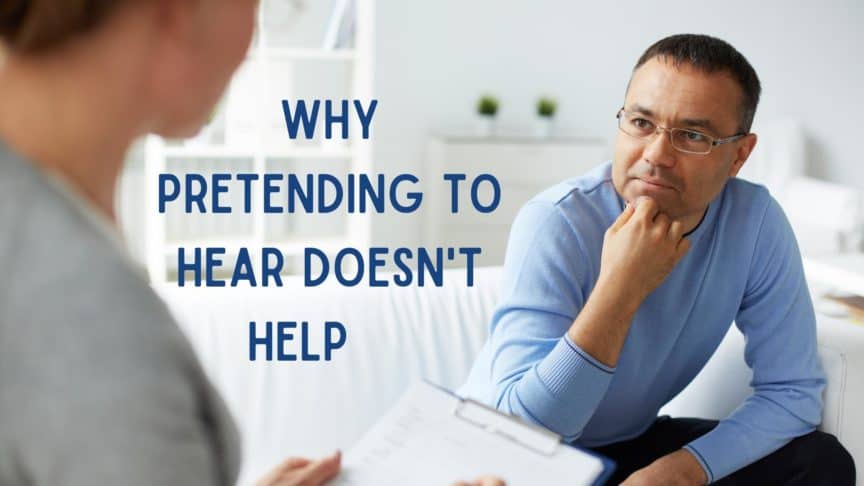- How to Care for Infants With Hearing Loss - April 15, 2024
- Hearing Aid Tips for Runners - April 5, 2024
- Overcoming Misconceptions Around Hearing Aids - March 27, 2024
Hearing loss is one of the most common medical conditions that people experience today. Though this chronic impairment is pervasive, impacting over 48 million people, it still tends to be underdiagnosed. There are a few reasons that hearing loss is often overlooked including that it typically happens gradually so people may not be aware that their hearing is changing for quite some time.
Also, it can be difficult for people to acknowledge changes to their hearing health and a common misconception about hearing loss is that it is not a serious condition. People often use strategies like pretending to hear and speaking loudly to cope with their hearing loss but this only delays treatment and worsens the impairment.
Impact of Pretending to Hear
We are all familiar with pretending to hear during a conversation. This looks like going along, nodding your head, giving verbal cues that you’re listening, etc. For people with untreated hearing loss, pretending to hear can become a default coping mechanism used for a variety of reasons including:
- to mask hearing impairment: people often experience difficulty coming to terms with and disclosing hearing loss with others
- don’t want to interrupt: we have all experienced not wanting to interrupt the other person while speaking
- asking for support can be difficult: asking others to repeat themselves or speak in a way that allows you to hear better can feel like too much
But pretending to hear can have various consequences that are more impactful than you suspect. This includes:
- strained communication: pretending to hear means that you are not fully understanding or participating in the conversation. This limits your capacity to respond and engage thoughtfully, impacting the quality of the conversation.
- worsening impairment: this is also a way to delay addressing hearing loss and this lack of treatment can cause the impairment to worsen and also lead to other health concerns. Untreated hearing loss increases the risk of accidental injuries and medical conditions including cognitive decline.
These effects can take a toll on how you feel on a daily basis – contributing to stress and anxiety. Strained communication can also cause people with untreated hearing loss to avoid social interactions, gatherings, activities etc. Social withdrawal means spending less time with others which can impact relationships as well as mental health.
Addressing Hearing Loss
If you find yourself frequently pretending to hear and/or notice changes with your hearing, it is important to have your hearing assessed. Conducted by a hearing healthcare specialist (likely an audiologist), hearing tests involve a painless and non-invasive process that measures hearing capacity in both ears. This process identifies impairment as well as the degree of hearing loss you could be experiencing.
Fortunately, there are useful ways that hearing loss is treated. The most common treatment is hearing aids which are small, electronic devices that are designed to provide significant support with absorbing and processing sound. This maximizes hearing ability, offering countless benefits including enhanced communication, relationships, social life, job performance etc.
Tips for Effective Communication
Treating hearing loss improves overall health outcomes and wellbeing. Hearing aids are more advanced than ever, coming with various features that allow them to be easily integrated into daily life. In addition to utilizing hearing aids, there are several strategies you can use to facilitate effective communication including the following:
- reduce background noise: by avoiding loud settings and choosing quieter environments to have conversations in, powering off any noisy electronic devices, turning off any music or television that may be on in the background etc. This better helps you hear more clearly and easily.
- avoid multitasking: trying to do other things during a conversation like texting, emailing, cooking etc. can be distracting. It can also create more noise for your brain to simultaneously process. Try to avoid engaging in other activities so that you can be completely present for the conversation.
- share hearing needs: be sure to share specific ways others can engage in conversation with you that is best for your hearing and understanding – speaking in a clear way, rephrasing rather than repeating, facing you while speaking etc. This creates a more accessible conversation that maximizes your hearing capacity.
If you are concerned about your hearing abilities, we’re here to help! Contact us today to learn more about how hearing loss treatment can benefit you.

